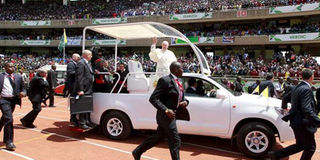Pope Francis is a rare star who not even a film scriptwriter could improve

Pope Francis waves to faithful as he leaves Kasarani Stadium after a meeting with youths on November 27, 2015. Very quickly after seeing Pope Francis up close, many turned into fans and he was treated more like a famous pop star than a religious figure at many stops. PHOTO | THOMAS MUKOYA | REUTERS
What you need to know:
- His final, strong warning at Kasarani about the problems generated by the primary role of ethnicity in society and the runaway corruption of the ruling elite was delivered with the grace and charm that can only come from a man with his unquestioned authority.
- He has the flamboyant gestures of a Latin American football commentator, waving and gesturing extravagantly to drive his points home.
That smile. It is so infectious, so wide and animated, it more closely resembles something out of a cartoon with loveable characters. A bit like Goofy, the tall Disney dog.
Then there is his humility and charming disregard for his own security.
On Thursday, clearly at the instructions of the organisers, all the armed policemen at the St Joseph’s the Worker Church in Kangemi were armed only with batons instead of guns.
Only the small contingent of plain-clothed guards carried concealed weapons, a striking departure from the show of might during the Obama visit or the self-important behaviour of local politicians.
All the way from the airport after his arrival, he rolled down the windows of his modest car and waved and flashed that wide smile again to the enthusiastic crowds.
He had clearly not been joking when he said he was not worried about bombs, only mosquitoes.
Then there is the way he speaks.
He has the flamboyant gestures of a Latin American football commentator, waving and gesturing extravagantly to drive his points home.
Even before the translation of his strong statements “the church is not a business or an NGO” to seminarians at St Mary’s on Wednesday, the audience was milking in the sermon.
His final, strong warning at Kasarani about the problems generated by the primary role of ethnicity in society and the runaway corruption of the ruling elite was delivered with the grace and charm that can only come from a man with his unquestioned authority.
His decision to spend time in Kangemi where he highlighted the criminal squalor in which many urban poor live and denounced the greed of those in positions of power was something that will empower the many activists that labour to improve the conditions in which the majority of urban dwellers live.
A fair number of Kenyans yawned and groaned about the possibility of traffic jams or the disaster that would ensue if some opportunistic terrorists struck during the visit when they heard the Pope was heading here.
ENVIABLE RECEPTION
Very quickly after seeing Pope Francis up close, many turned into fans and he was treated more like a famous pop star than a religious figure at many stops.
Even diplomats at Unep could not stop clicking photos and taking selfies with the great man in the background.
Pope Francis rocked.
His visit inspired many but as ever, whether it will have the lasting impact it should, including in teaching government officials and leaders of the church how to relate with the public in a civilised manner is open to question.
***
The signature peculiarity of Kenyans was on display after the Pope’s speech at Kasarani.
While the pontiff spoke about the need to have discipline, to embrace values “that are not listed on the stock exchange,” to respect the elderly and to avoid corruption, the gathered youth cheered wildly.
A few minutes after the Pope left, some of the youth returned to type.
They started robbing attendees and several foreign reporters, unaware of how to kaa chonjo Kenyan-style (stay on your guard) while in a large crowd, lost their bags including laptops and passports.
One young woman snatched a phone from another youth and a remarkable spectacle unfolded with around a dozen policemen chasing her and eventually cornering her somewhere near the washrooms at the stadium.
Kenyans, eh?
****
Binyavanga Wainaina is probably the most important writer of his generation in this region.
His 2005 essay in the literary magazine, Granta, criticising the prejudices of foreign correspondents and authors, sarcastically titled How to Write about Africa, is a classic of its genre. (http://granta.com/how-to-write-about-africa/)
“Avoid having the African characters laugh, or struggle to educate their kids, or just make do in mundane circumstances,” he wrote. “…Remember, any work you submit in which people look filthy and miserable will be referred to as the ‘real Africa’, and you want that on your dust jacket.”
Binyavanga sadly suffered a stroke on October 31.
Those that would like to make a donation to facilitate specialised treatment for the author in India can do so using mobile money transfers by texting BINYA to 22231 and following directions while those abroad can follow this link: https://secure.changa.co.ke/index.php/myweb/share/5417/





